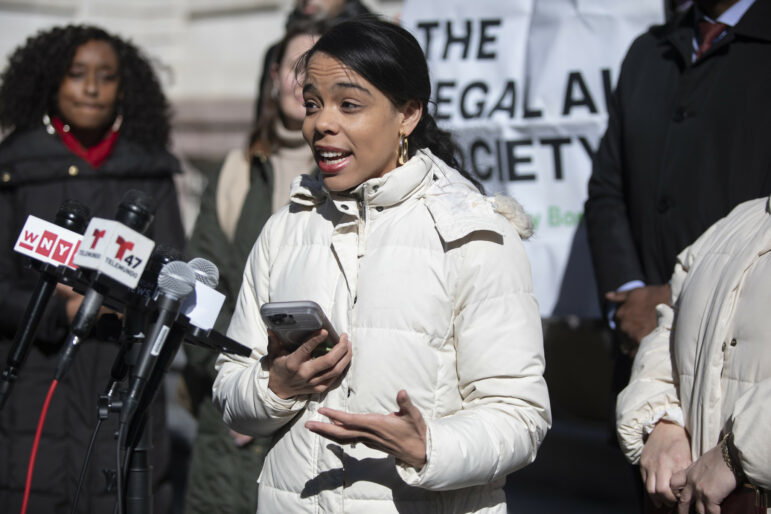In a motion set to be filed Wednesday in state court, the legislative body asks to join a recently-filed lawsuit against Mayor Eric Adams’ administration, seeking to compel implementation of several laws passed over mayoral veto.

Emil Cohen/NYC Council Media Unit
Councilmember Pierina Sanchez at a press conference last week announcing Legal Aid’s lawsuit. Sanchez sponsored a bill, which City Hall is now refusing to implement, which would expand voucher eligibility to New Yorkers facing an eviction.The New York City Council is jumping into the ring.
In a motion set to be filed Wednesday in state court, the legislative body requests to join a recently-filed lawsuit against Mayor Eric Adams’ administration, seeking to compel implementation of several laws aimed at expanding city rental voucher eligibility.
The move could bring the Council into direct legal conflict with the mayor—a posture not seen since the Bloomberg administration. In 2006, New York’s highest court sided with then Mayor Michael Bloomberg in his refusal to implement a bill extending health benefits to domestic partners, saying it violated state and federal law.
At the heart of the current dispute is the City Family Homelessness and Eviction Prevention Supplement (CityFHEPS) program, which allows tenants to pay up to 30 percent of their income on rent while the city covers the rest, up to a fixed maximum.
The Council passed several laws last summer over mayoral veto, expanding CityFHEPS eligibility outside of Department of Homeless Services shelters, raising the income ceiling, and eliminating work requirements, among other reforms.
While City Hall has implemented portions of them—nixing a 90-day waiting period to access vouchers in shelter, and adding flexibility to how vouchers cover utility costs—the administration has refused to move on the rest, citing “substantial financial, operational and legal issues.”
“The Council enacted the CityFHEPS reform laws to ensure housing vouchers are used to more effectively help prevent low-income New Yorkers from facing evictions and homelessness, and the mayor’s administration has a responsibility to implement local laws,” Deputy Council Speaker Diana Ayala, a co-sponsor on the legislation, stated Wednesday.
The conflict comes amid a record homelessness crisis, and as New Yorkers face an historically tight rental market. Evictions are also on the rise, though they have yet to reach pre-pandemic levels.
“Because the Council validly enacted the CityFHEPS Reform Laws, the Mayor is now legally required by the Charter to implement them,” the Council’s court motion states.
“But he refuses to do so,” it continues. “His refusal not only deprives New Yorkers of housing benefits to which they are entitled under the law; it usurps the powers of the Council, a co-equal branch of City government, and it upends the separation of powers enshrined in the City Charter.”
On Feb. 14, Legal Aid filed the case the Council is seeking to join—a proposed class action on behalf of four New Yorkers who say they should be eligible for CityFHEPS, but are closed out because the Adams administration has failed to implement the expansion laws.
Among them are three women who say they are at risk of eviction and should be able to access city vouchers outside of shelter, and a fourth woman who lives in shelter but earns too much to qualify for CityFHEPS under the old regime.
The suit was brought under Article 78 of the New York State Civil Practice and Rules (CLPR), which lays out the process for a lawsuit against an administrative agency if it declines to perform an act that’s legally required of it.
If the Council is successful, it will join the lawsuit as a new petitioner. In addition to supporting the existing claims, the body will request an additional declaration that the CityFHEPS laws do not conflict with state authority.
The mayor has frequently said as much. In a statement last week following Legal Aid’s filing, a mayoral spokesperson said the laws “violate state law as they seek to legislate in an area where authority is reserved to the state.”
In an written statement Tuesday, a spokesperson reiterated this, and said the program would be too costly to implement and would increase competition among voucher holders.
“We always seek to work collaboratively with our colleagues at the City Council and look forward to identifying more areas of common ground to support New Yorkers experiencing homelessness, including an aggressive, citywide effort to build more housing in every neighborhood,” City Hall said. “We will review the filing.”*
Wednesday’s motion pushes back on Adams’ state authority argument. “In broad strokes, the Mayor contends that the Reform Laws are preempted by the New York State Social Services Law and should have been passed through referendum,” the filing states.
Yet “the laws are valid; they are not preempted by state law and they do not curtail budgetary authority such that they must have been passed by a referendum.”
The Council has also pointed to past reforms the city made to the program without incident, such as raising the value of rental vouchers in 2021.
It remains to be seen whether Judge Lyle E. Frank, who has been assigned to the case, will let the Council join. Last week, Judge Frank set several filing deadlines in early March.
By March 5, City Hall must make its case as to why the court shouldn’t order the administration to “immediately implement the CityFHEPS expansion by offering vouchers to petitioners and all similarly situated applicants for CityFHEPS who are eligible under the newly enacted laws,” according to an order to show cause.
The plaintiffs will have a chance to reply, with all papers due by March 12.
To reach the reporter behind this story, contact Emma@citylimits.flywheelstaging.com. To reach the editor, contact Jeanmarie@citylimits.flywheelstaging.com
*This story has been updated with comment from City Hall.








